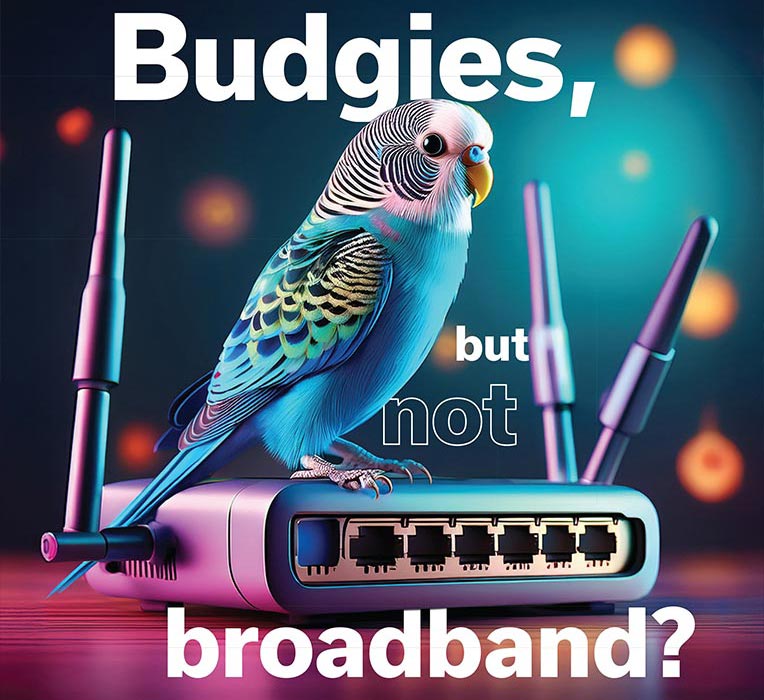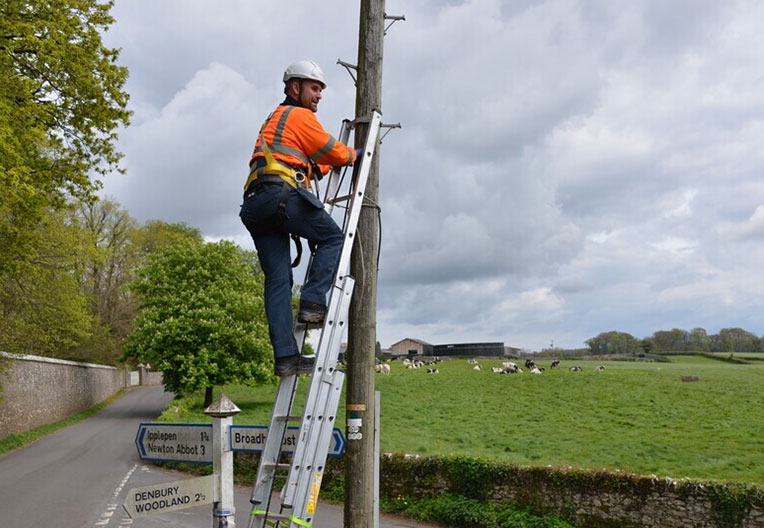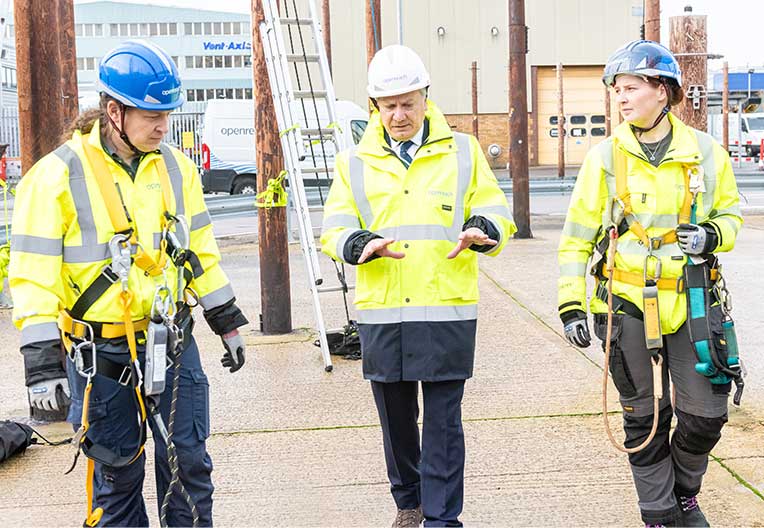
Policy Hub
How to back better broadband
The changes we need
Deploy Flexi permit trials to deliver a more efficient build
Address access issues to prevent a new digital divide
Reform the Apprenticeship levy for our changing training needs
Supporting the growth mission
Openreach is leading the way in providing the UK with world-class digital technology.
We are the backbone of the digital revolution.
In October, we passed 20 million homes and businesses with full fibre broadband, and we are on track to deliver our target of 25 million premises by the end of 2026. A great British infrastructure success story.
But the job is not finished.
Our ambition to build to 30 million premises by 2030 is now at risk and we need the support of the regulator and government to ensure the necessary conditions.
It is vital that this support takes the form of:
- A clear, investable regulatory framework. Ofcom’s current Telecoms Access Review should set a clear pathway for gold standard deregulation in the best interests of consumers’.
- Action to remove build barriers. Urgent action to address the Multi-Dwelling Unit challenge, where industry requires individual wayleaves from landlords, many of whom are unresponsive. This is digitally excluding hundreds of thousands of flats right across the country. It also includes the approval of a more flexible permitting regime, to allow for time and costs savings for local authorities and builders.
- Continued funding for Project Gigabit and related schemes. These schemes are crucial in ensuring digital inclusion in some of the hardest to reach parts of the country.
Budgies, but not broadband?
Openreach is currently unable to reach hundreds of thousands of flats across the UK. These homes are in so-called Multi-Dwelling Units (flats or sub-divided houses).
This is because we are unable to secure the permissions required from landlords.
Currently, we use our existing access rights – or wayleaves – to access communal areas in flats to repair the copper network, but we cannot use those same rights to upgrade tenants to the latest technology.

More flexible street works permitting to support efficiency
Openreach alone applies for 300,000 permits a year to councils across the country to deliver our digital upgrades on a street-by-street basis, and this is set to double as we build to 30 million homes and businesses by 2030.
More flexible permitting is supported across the industry and offers a solution that can improve efficiency by around a quarter, reduce permit processing by up to 90% in local authorities and limit the carbon footprint of construction.
How Full Fibre is enabling skills development and creating benefits in the NHS
The rollout of Full Fibre is creating benefits across society. At The Hamlet in Wigan access to fast reliable broadband has enabled young people to develop new skills. Full Fibre is also proving essential when it comes to widening access to GP appointments, according to Dr Murray Ellender, co-founder of eConsult.
Full Fibre broadband essential for supporting rural businesses
Running any rural business can be tough. In the case of Westerlands Farm in the South Downs, Antonia Jamison runs a hospitality business as a second revenue stream, thanks to her access to ultrafast, ultra-reliable Full Fibre broadband.
Delivering the UK's Full Fibre broadband future
When faced with limited job opportunities for women on the Isle of Jura, Claire Fletcher decided to take matters into her own hands. She embarked on a journey to establish Lussa Drinks Company, turning her passion for crafting artisanal spirits into a successful business. Despite many challenges, Claire and her team persevered and flourished, thanks in part to Openreach’s Full Fibre broadband.
/photography/people/openreach-staff/engineers/Openreach-CEO-Clive-Selley-D-750x500.jpg)
Closing the gap on the broadband digital divide
Openreach is working in partnership with Government to build ultrafast, ultra-reliable broadband to 312,000 more homes that would otherwise be left behind by the private sector. Here, Openreach CEO Clive Selley, looks at other ways the Government can work with us to help build our full fibre network even further and faster.
Our publications and resources
To read all of our latest blogs, please click here

Our response to Ofcom’s Consultation: Promoting competition and investment in fibre networks: Telecoms Access Review
On 20 March 2025, Ofcom published its consultation document Promoting competition and investment in fibre networks: Telecoms Access Review (TAR) 2026-31 (the Consultation). This response is provided by Openreach Limited - a wholly owned subsidiary of BT Group plc.

Centre for Economics and Business Research (CEBR) Report
The latest research conducted by Stantec and CEBR highlights the impact of the remainder of our Full Fibre rollout on the UK. The rollout has the potential to contribute up to £66 billion to the UK economy in 2029, help over 620,000 individuals back into work while also improving the pass rates in our school and increase the number of online GP appointments.

Full Fibre productivity
The latest research undertaken by Be The Business on behalf of Openreach outlines the value of Full Fibre for Small and Medium Sized Enterprises (SMEs). The report sets out how nationwide Full Fibre broadband can unlock productivity growth in SMEs and myth busts common assumptions around broadband connectivity.

Closing the gap on the broadband digital divide
Openreach is working in partnership with Government to build ultrafast, ultra-reliable broadband to 312,000 more homes that would otherwise be left behind by the private sector. Here, Openreach CEO Clive Selley, looks at other ways the Government can work with us to help build our Full Fibre network even further and faster.

Bridging the digital divide
In the UK, there are over 800,000 Multi Dwelling Units (flats) that we currently cannot access. While we can enter these properties to fix copper network issues as permitted by law, upgrading to Full Fibre requires separate permission from the landlord, which is challenging to obtain.

Navigating Scotland’s nuances to deliver better broadband
Scotland excels in industries such as energy, life sciences, technology, and the digital elements of creative industries. But growth in these key sectors is underpinned by reliable broadband connections. Delve into how we are bringing reliable broadband to Scotland.


Fibre opportunity for rural areas in the UK
In our modern world, better connectivity can be vital in ensuring the sustainability of rural life across the UK. As we know the importance of rural connectivity, explore how we are working to bring Full Fibre to the most rural parts of the UK.

A greener future
Our mission – to build Full Fibre – will create a more sustainable communications network: more energy efficient, more reliable, and an integral part of a greener economy that is fit for the future. Discover how we aim to build and maintain our network sustainably.


Our record in Wales
Wales is a leader in technological innovation with several growing sectors, and as we continue to build across the nation, we know that our Openreach network is key to achieving a stronger, fairer, greener Wales.
Meet our team
/photography/people/openreach-staff/public-affairs--team/miles_evans_737x737.png)
/photography/people/openreach-staff/public-affairs--team/gill_girvin_737x737.png)
/photography/people/openreach-staff/public-affairs--team/Gareth-Lonie-737x737.jpg)
/photography/people/openreach-staff/public-affairs--team/michael_salter_church_737x737.png)
/photography/people/openreach-staff/public-affairs--team/William_Woodroofe_737x737.jpg)
Contact us
If you require support with parliamentary casework, please contact our dedicated team at parliamentary.help@openreach.co.uk.
Should you have a general query, please contact public.affairs@openreach.co.uk.
Please note that our Public Affairs inbox is to support parliamentarians and policy makers and is not for customer correspondence. To ensure you find the right place for your issue, please refer to our Help and Support section.




















